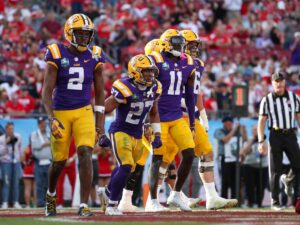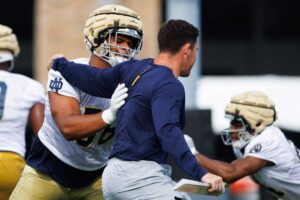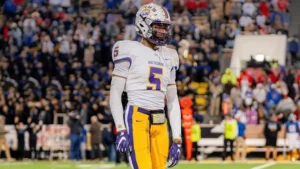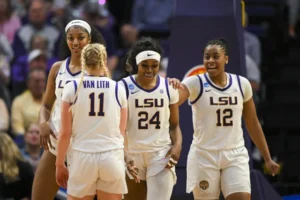
“Iamaleava the Villain? Why Tennessee’s No Victim in College Football’s Era of Change”
It didn’t take long for the paint to dry on Nico Iamaleava’s mural in Knoxville before the former Tennessee quarterback was already being repainted as a villain. In the age of NIL, transfer portals, and shifting loyalties, it seems everyone is quick to cast roles: hero, traitor, savior, or sellout. And when a five-star, face-of-the-program quarterback decides to pack up and leave Rocky Top, the narrative practically writes itself. But as easy as it might be to play the blame game, there’s a simple truth here—Tennessee is no victim.
Iamaleava, once the crown jewel of Josh Heupel’s recruiting efforts, was always seen as the guy who’d bring the Volunteers back to sustained relevance in the SEC. He had the arm, the athleticism, the poise, and—perhaps most importantly—the marketing appeal. His arrival came with hype and a near-$1 million NIL deal, part of the new landscape where college football is as much business as it is sport. But after just one year in Knoxville, whispers turned into reports, and reports became reality. Iamaleava entered the transfer portal, opting to take his talents elsewhere. His departure stung. But it shouldn’t have shocked anyone.
This isn’t betrayal. This is the new normal.
To frame Iamaleava as the villain is to ignore the tide of change sweeping through the sport. The same system that allowed Tennessee to land him in the first place—a system flush with NIL money and lax transfer restrictions—is the very one that allowed him to leave. The door swings both ways. College football programs across the country have leaned into this modern ecosystem when it benefits them. Players, too, have learned to exercise their autonomy.
Tennessee certainly has.
The Volunteers, like every other major program, have made use of the transfer portal when it suited their needs. They’ve brought in plug-and-play starters, revamped entire position groups, and leaned on the very flexibility now being criticized in Iamaleava’s case. This is not a one-way street. It’s a marketplace, and Nico, just like Tennessee, is a participant. Not a villain. Not a victim. Just another player—literally and figuratively—in the high-stakes game of modern college football.
Josh Heupel’s program will move on. It must. Tennessee, after all, is not some mid-tier school clinging to hope. It’s an SEC heavyweight with national ambitions. The quarterback room still boasts talent. The recruiting machine is still humming. The NIL collectives are still cutting checks. Iamaleava’s exit, while dramatic, is not a death knell. It’s just the latest twist in a sport that thrives on them.
And perhaps that’s the broader point. The outrage over Iamaleava’s decision says more about the culture of college football fandom than it does about the player himself. Fans have long asked for loyalty, for commitment, for tradition. But the institutions those fans support have rarely lived by the same standards. Coaches jump ship for bigger contracts. ADs shuffle priorities based on revenue projections. Conferences realign not for regional identity or history, but for TV dollars and streaming rights.
So when a 20-year-old quarterback does what’s best for his career—be it for financial reasons, playing time, scheme fit, or personal happiness—how can he be faulted? The idea that he owes Tennessee anything more than what he gave—a year of commitment, a bowl win, a season of sacrifice—is outdated. He upheld his end of the deal. The deal just didn’t guarantee a four-year marriage.
If anything, Iamaleava’s story should serve as a case study in how the sport is evolving, not as a cautionary tale about player loyalty. He arrived with expectations, delivered in flashes, and decided his future lay elsewhere. That’s not betrayal; that’s agency. And if college football is going to operate like a business, then players must be allowed to act like businessmen. Fans want the thrill of the free market when it results in elite talent choosing their school. But when that same market leads talent away, they cry foul.
It doesn’t work like that.
No doubt, Iamaleava’s departure will sting in Knoxville, especially if he thrives at his next stop. And he might. The tools are there. If he goes on to light up Saturdays in another uniform, the narrative of what might have been will follow him like a shadow. But that doesn’t make Tennessee a victim—it just makes them part of the sport’s evolution.
If anything, programs like Tennessee are better positioned than most to weather this kind of storm. They have resources, they have fan passion, and they have institutional commitment. And in the end, the quarterback carousel always keeps turning. Just as Hendon Hooker once arrived and made Iamaleava wait, there will be another passer who arrives, takes the reins, and writes his chapter in orange and white. The portal taketh, but it also giveth.
The harshest critics of Iamaleava’s exit often sound like scorned lovers—hurt not just by his decision, but by the implication that Tennessee wasn’t enough. But again, this is a transactional era. Love for the jersey is real, but it’s not absolute. College football has become professionalized in everything but name. And professionals, just like in the NFL, change teams. They chase opportunity. They seek environments that match their ambitions.
It’s also worth noting that Iamaleava didn’t trash the program on his way out. He didn’t throw teammates under the bus, or ignite a media circus. He handled it quietly, as many transfers do. That restraint should count for something, even if it doesn’t ease the pain for fans hoping he’d be the guy to carry them to Atlanta—or even the Playoff. But again, hope is not a contract. And expectations aren’t promises.
The vitriol aimed at Iamaleava feels oddly disproportionate, especially when so many have benefited from the system now being weaponized against him. College football’s hypocrisy doesn’t lie in the fact that players transfer—it lies in the way we selectively judge those moves. If Tennessee had flipped a high-profile quarterback away from another program, would there be a single complaint in Knoxville? Of course not. They’d call it savvy recruiting.
That’s the game now.
If there’s a takeaway here, it’s that loyalty and commitment, while still important, can no longer be assumed to flow in one direction. Programs have to earn it every day—not just from fans, but from players too. Culture matters. Fit matters. Opportunity matters. And if a school can’t offer all three, they risk losing their most talented athletes. That’s not betrayal. That’s reality.
For Tennessee, the next step is clarity. There’s no room for self-pity in the SEC. If Iamaleava’s departure hurts, the cure is winning. The cure is developing the next star. The cure is adapting faster than the chaos around them. And Josh Heupel has already shown he can do that. He built a winner before Iamaleava arrived. He can do it again.
So let’s stop with the villain talk. Let’s stop pretending Tennessee was blindsided or wronged. This is college football in 2025. It’s messy. It’s fluid. And yes, sometimes it’s painful. But it’s also thrilling, unpredictable, and dynamic. Programs rise and fall. Players come and go. But the sport endures.
Nico Iamaleava made a choice. Tennessee will make theirs. And as long as both sides keep competing, nobody’s a victim. Just participants in the most dramatic show in American sports.





